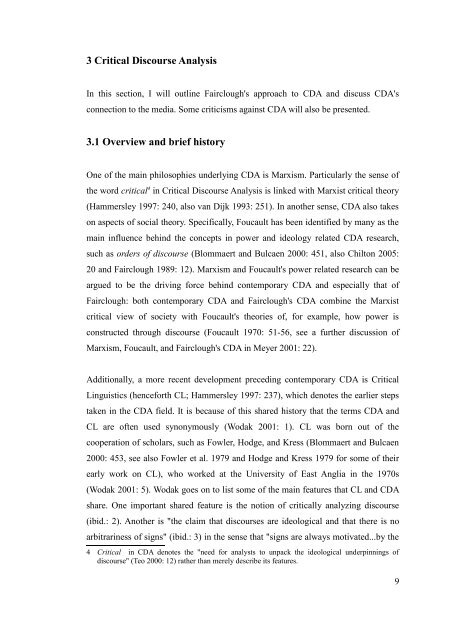Political Bias on BBC, CNN, and Fox News - Doria
Political Bias on BBC, CNN, and Fox News - Doria
Political Bias on BBC, CNN, and Fox News - Doria
You also want an ePaper? Increase the reach of your titles
YUMPU automatically turns print PDFs into web optimized ePapers that Google loves.
3 Critical Discourse Analysis<br />
In this secti<strong>on</strong>, I will outline Fairclough's approach to CDA <strong>and</strong> discuss CDA's<br />
c<strong>on</strong>necti<strong>on</strong> to the media. Some criticisms against CDA will also be presented.<br />
3.1 Overview <strong>and</strong> brief history<br />
One of the main philosophies underlying CDA is Marxism. Particularly the sense of<br />
the word critical 4 in Critical Discourse Analysis is linked with Marxist critical theory<br />
(Hammersley 1997: 240, also van Dijk 1993: 251). In another sense, CDA also takes<br />
<strong>on</strong> aspects of social theory. Specifically, Foucault has been identified by many as the<br />
main influence behind the c<strong>on</strong>cepts in power <strong>and</strong> ideology related CDA research,<br />
such as orders of discourse (Blommaert <strong>and</strong> Bulcaen 2000: 451, also Chilt<strong>on</strong> 2005:<br />
20 <strong>and</strong> Fairclough 1989: 12). Marxism <strong>and</strong> Foucault's power related research can be<br />
argued to be the driving force behind c<strong>on</strong>temporary CDA <strong>and</strong> especially that of<br />
Fairclough: both c<strong>on</strong>temporary CDA <strong>and</strong> Fairclough's CDA combine the Marxist<br />
critical view of society with Foucault's theories of, for example, how power is<br />
c<strong>on</strong>structed through discourse (Foucault 1970: 51-56, see a further discussi<strong>on</strong> of<br />
Marxism, Foucault, <strong>and</strong> Fairclough's CDA in Meyer 2001: 22).<br />
Additi<strong>on</strong>ally, a more recent development preceding c<strong>on</strong>temporary CDA is Critical<br />
Linguistics (henceforth CL; Hammersley 1997: 237), which denotes the earlier steps<br />
taken in the CDA field. It is because of this shared history that the terms CDA <strong>and</strong><br />
CL are often used syn<strong>on</strong>ymously (Wodak 2001: 1). CL was born out of the<br />
cooperati<strong>on</strong> of scholars, such as Fowler, Hodge, <strong>and</strong> Kress (Blommaert <strong>and</strong> Bulcaen<br />
2000: 453, see also Fowler et al. 1979 <strong>and</strong> Hodge <strong>and</strong> Kress 1979 for some of their<br />
early work <strong>on</strong> CL), who worked at the University of East Anglia in the 1970s<br />
(Wodak 2001: 5). Wodak goes <strong>on</strong> to list some of the main features that CL <strong>and</strong> CDA<br />
share. One important shared feature is the noti<strong>on</strong> of critically analyzing discourse<br />
(ibid.: 2). Another is "the claim that discourses are ideological <strong>and</strong> that there is no<br />
arbitrariness of signs" (ibid.: 3) in the sense that "signs are always motivated...by the<br />
4 Critical in CDA denotes the "need for analysts to unpack the ideological underpinnings of<br />
discourse" (Teo 2000: 12) rather than merely describe its features.<br />
9

















